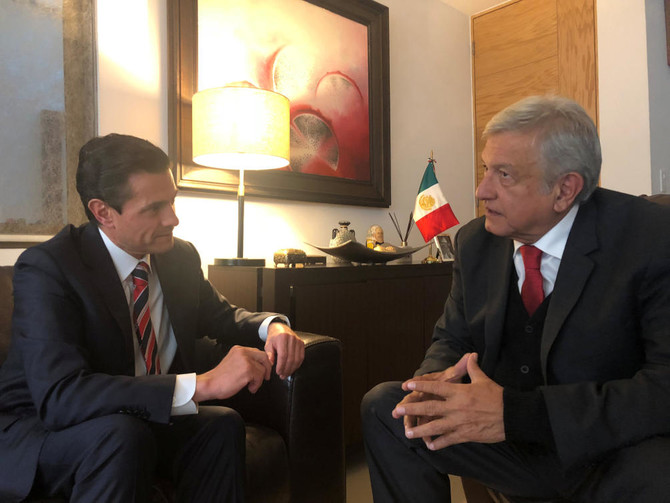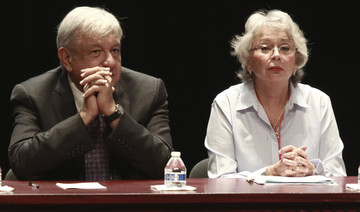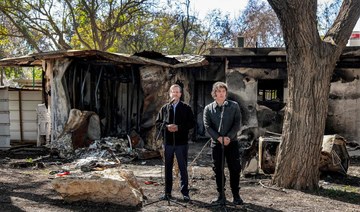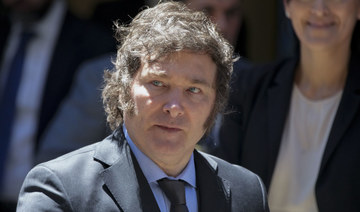MEXICO CITY: Mexico’s incoming president, Andres Manuel Lopez Obrador, is folksy, plain-spoken, and spontaneous — perhaps too much so for financial markets, which have been roiled in advance of his inauguration Saturday.
Lopez Obrador is the first president since the Mexican Revolution to rise to prominence as a protest leader, and he sees his inauguration as a historic “fourth transformation” of Mexico, following independence from Spain, the liberal reforms that broke the church’s dominance in the 1850s and the 1910-1917 revolution.
His calls for a crusade against corruption and his professed concern for the common people often assume the proportion of a moral mission, with a zeal that carries over to pet projects, such as a costly rural railroad project, that baffle or alarm critics.
So, who will he listen to? It’s pretty clear he hears the financial markets, at least when they make noise about the prospect of a president who in the past has railed against a “mafia of power” that included major business figures.
One ratings agency downgraded Mexico’s outlook to “negative” and the peso and stocks have plunged in recent weeks after conflicting signals from Lopez Obrador’s team, prompting conciliatory words from the incoming leader.
“We are going to give a lot of reassurance to investors, to those who invest in shares, in companies, in financial markets. Their investments will be guaranteed, and they will get good returns, because there will be true rule of law,” Lopez Obrador said in a taped message four days before taking office.
He boasts of listening to the people, and has submitted his pet projects to a series of unofficial “referendums,” winning overwhelming support, though with the participation of only about 1 percent of registered voters. “We will always be looking for more legitimacy, more support from the people,” he said.
At the same time, the man who built his political career on defending the poor faces a huge immediate challenge: the thousands of impoverished Central American migrants camped out in squalid conditions on the border with the United States and the thousands more on the way. US President Donald Trump has threatened to close border crossings to prevent them from entering, and Mexico’s new leader — once labeled a hot-head — appears ready to defuse the situation by agreeing to provide better housing for the migrants while they wait for months on Mexican soil for a chance to apply for asylum in the US
But Lopez Obrador dismisses his domestic critics as “fifi” — Mexican slang for elitist or frivolous — saying they need to spend more time with the poor and people in small towns.
Lopez Obrador, who led protests against oil pollution in his swampy native state of Tabasco, comes across as friendly, if a bit obstinate, and surely has a kind of charisma. Certainly, no politician in Mexican history has shaken more hands or toured more dusty small towns than Lopez Obrador over more than a dozen years of campaigning for the presidency.
That hands-on style echoes the folksy autocracy of his hero of the 1930s, Lazaro Cardenas, who nationalized the oil industry as a nearly all-powerful president. But many worry about how well Lopez Obrador will respect the opposition, or the counterbalances put in place in recent decades to limit presidential power.
“I think he is resurrecting the imperial presidency of 30 or 40 years ago,” said Jose Antonio Crespo, a political analyst at Mexico’s Center for Economic Research and Training. “But it is also mixed with Lopez Obrador’s personal style, which is disorderly, ambiguous, contradictory and capricious.”
“He is going to govern by whim, according to his desires, and he’s going to ride roughshod over institutions,” Crespo said.
On the other hand, many of those who contributed to Lopez Obrador’s crushing tidal wave of victory in the July 1 elections look forward to his inauguration with enormous hope that he will wrest power from market-oriented technocrats, and produce jobs and better wages.
Francisco Javier Martinez Cardenas, a 59-year-old street vendor who uses crutches and has high blood pressure, waited in line to cast his vote in one of Lopez Obrador’s “referendums” last week. “This is something innovative,” he said of the vote. “Before, the government never consulted us on anything. Before, when the government decided something, we only heard about it, sometimes months, even years later.”
Gustavo de la Vega, a 30-year-old industrial designer who also voted in the referendum — but against some of the projects — said, “I do have a lot of hope ... but we’re not giving him a blank check.”
One project being put to the vote was Lopez Obrador’s plan for a “Maya train” that would link resorts like Cancun and Tulum with colonial Merida and the jungle ruins of Palenque and Calakmul on the Yucatan Peninsula. He announced a start date for the $7.5 billion project, though there has been no environmental impact statement, serious economic feasibility study or consultation with indigenous communities, as required by law.
Lopez Obrador brushed off experts who led a petition drive against the plan, accusing them of being out of touch with the people.
“Look at what the petition-signers don’t know,” Lopez Obrador wrote. “I say it with all respect and I recognize the majority are very smart people, but as amazing as it sounds, they need to make contact with the people in the countryside.”
He has taken a similar broad-brush approach to Mexico’s main problems.
For example, Lopez Obrador wants to build an expensive new refinery to restore Mexico, which now imports much of its gasoline, to the glory days of big oil in the 1970s, though many analysts say that will only add to the woes of the debt-strapped state oil company.
He hasn’t outlined any plan to stop gangs that drill illegal taps into government pipelines an average of 40 times every day, looting a major source of government revenues while occasionally sparking explosions and employing entire neighborhoods as protective human shields.
He has also been vague about how he will tackle the drug cartels, kidnappers and extortionists who have boosted Mexico’s homicide rates to historic levels.
Contrary to calls to return soldiers to their barracks and remove them from civilian law enforcement, Lopez Obrador now has proposed creating a National Guard under military control, subsuming the federal police and military police.
That plan, too, lacks specifics. “It doesn’t have any strategies for action, it doesn’t say how they’re going to do things,” said Raul Benitez, a security expert and professor at the National Autonomous University of Mexico.
So far, however, Lopez Obrador has proved surprisingly adept at handling foreign relations despite having almost no experience in the field, and when confronted with Trump and his sometimes threatening language toward Mexico.
“He has a good relationship with the United States,” Benitez said. “Foreign relations have been the best area I have seen” in the incoming administration. “He got involved in negotiations on the free trade agreement, and that didn’t go badly.”
New leftist president promises transformation of Mexico
New leftist president promises transformation of Mexico

- Lopez Obrador is the first president since the Mexican Revolution to rise to prominence as a protest leader
- His calls for a crusade against corruption and his professed concern for the common people often assume the proportion of a moral mission
Austria to resume aid to UN agency for Palestinians
Israel alleged in January that some United Nations Relief and Works Agency (UNRWA) employees may have participated in the Hamas attacks on October 7 that triggered the war in the Gaza Strip.
In the weeks that followed, numerous donor states, including Austria, suspended or paused some $450 million in funding.
Many, including Germany, Sweden, Canada and Japan, had since resumed funding, while others have continued to hold out.
“After analizing the action plan in detail” submitted by UNRWA “to improve the functioning of the organization,” Austria has decided to “release the funds,” its foreign ministry said in a statement.
A total of 3.4 million euros ($3.7 million) in funds have been budgeted for 2024, and the first payment is expected to be made in the summer, the statement said.
“Some of the Austrian funds will be used in the future to improve internal control mechanisms at UNRWA,” it added.
Austria said it will “closely monitor” the implementation of the action plan with other international partners, noting that “a lot of trust had been squandered.”
The Alpine country said it has substantially increased support for the suffering Palestinian population in Gaza and the region since 7 October, making 32 million euros ($34.8 million) in humanitarian aid available to other international aid organizations.
The Hamas attack on October 7 resulted in the death of more than 1,170 people in Israel, most of them civilians, according to an AFP tally based on official Israeli figures.
Israel’s campaign in Gaza has since killed at least 35,303 people, also mostly civilians, according to data provided by the health ministry in the Hamas-run territory.
Flash floods kill at least 50 people in western Afghanistan

- Death toll was based on preliminary reports and might rise
- Hard-hit province of Ghor has suffered significant financial losses
ISLAMABAD: Flash floods from heavy seasonal rains in western Afghanistan have killed at least 50 people and dozens remain missing, a Taliban official said on Saturday, adding the death toll was based on preliminary reports and might rise.
Afghanistan has been witnessing unusually heavy seasonal rains.
The hard-hit province of Ghor has suffered significant financial losses, said Abdul Wahid Hamas, spokesman for the provincial governor, after thousands of homes and properties were damaged and hundreds of hectares of agricultural land destroyed following Friday’s floods, including the capital city Feroz Koh.
The Taliban’s government chief spokesman posted on social platform X, mourning “the loss of our fellow Afghans,” and urged ” responsible authorities ... to provide all necessary support to alleviate the suffering.” He also called on “our benevolent donors” to help and humanitarian organizations to provide the affected communities with aid.
Last week, the UN food agency said the exceptionally heavy rains in Afghanistan have killed more than 300 people and destroyed thousands of houses, mostly in the northern province of Baghlan, which bore the brunt of floods on May 10th.
Survivors have been left with no home, no land, and no source of livelihood, the World Food Organization said. Most of Baghlan is “inaccessible by trucks,” said WFP, adding that it is resorting to every alternative it can think of to deliver food to the survivors.
The latest disaster came on the heels of devastating floods that killed at least 70 people in April. The waters also destroyed about 2,000 homes, three mosques and four schools in western Farah and Herat, and southern Zabul and Kandahar provinces.
Nearly 10,000 evacuated in Ukraine’s Kharkiv region: governor

- Ukrainian President Volodymyr Zelensky plays down Russia’s gains in the offensive
- Moscow has been attacking several settlements including Vovchansk, just five kilometers from the border
KYIV: Nearly 10,000 people have been forced to leave their homes in Ukraine’s northeastern Kharkiv region since a ground attack launched by Russian forces on May 10, the regional governor said.
The assault may only be the first wave of a wider offensive, Ukrainian President Volodymyr Zelensky said.
Over a week after its launch, “a total of 9,907 people have been evacuated,” governor Oleg Synegubov said.
They were fleeing Russian soldiers who managed to advance between five to 10 kilometers (three to six miles) along the northeastern border before being stopped by Ukrainian forces.
Synegubov said Ukraine’s armed forces had repelled two attempts to break through defenses overnight.
The situation was “under control” with “defenders in certain areas conducting assault... and combing operations.”
Moscow has been attacking several settlements including Vovchansk, just five kilometers from the border.
“In the area of the city of Vovchansk, Ukrainian troops are reinforcing their defense,” Synegubov said.
A day earlier, he said Russian forces have started to destroy Vovchansk and all but 200 of its residents have fled due to fighting.
Russian forces have taken 278 square kilometers (107 square miles) between May 9 and 15, their biggest gains since the end of 2022, AFP calculated using data from the Institute for the Study of War (ISW).
Russia’s offensive “could consist in several waves. There was the first wave” in the Kharkiv region, Zelensky said journalists.
Zelensky played down Russia’s gains in the offensive but added: “We have to be sober and understand that they are going deeper into our territory. Not vice versa. And that’s still their advantage.”
Speaking about the offensive during a visit to China on Friday, Russian President Vladimir Putin said it was a response to Ukraine shelling border regions.
Nepal latest to ban Indian spice brands over safety concerns

- Hong Kong, Singapore last month banned products from Everest and MDH after tests detected presence of ethylene oxide
- Besides its use as a pesticide, ethylene oxide is used to sterilize medical equipment and as a sterilising agent in spices
KATMANDU: Nepal has become the latest jurisdiction to ban the import and sale of two popular Indian spice brands after reports that some of their products contained a cancer-causing pesticide, officials said Friday.
Hong Kong and Singapore last month banned products from Everest and MDH — two brands popular in India and exported worldwide — after tests detected the presence of ethylene oxide, according to media reports.
Besides its use as a pesticide, ethylene oxide is used to sterilize medical equipment and as a sterilising agent in spices to prevent illnesses caused by salmonella and E. Coli bacteria.
Regular exposure to the colorless and odourless compound increases the “risk of cancers of the white blood cells,” according to the US Environmental Protection Agency.
Matina Joshi Vaidya, chief of Nepal’s Department of Food Technology and Quality Control, told AFP that the Himalayan country had also decided to halt the sale of the spice blends.
“It is an issue of public health,” she said. “We have its banned import and sale from Thursday.”
Nepal has banned four products — three variants produced by MDH and one by Everest.
“We do not have the lab resources to run the tests in the country. The ban will be lifted when Indian authorities declare it safe,” Vaidya said.
Everest and MDH are India’s top two spice brands with a market share of 16 and 10 percent respectively in 2022, according to consumer research monitor Statista.
Both companies have put out statements denying their products pose a health hazard to consumers after the Singapore and Hong Kong import bans.
“We clarify and state unequivocally that these claims are untrue and lack any substantiating evidence,” MDH said last month on social media platform X.
India’s food regulation agency has asked for state authorities to carry out random testing of spice products, broadcaster NDTV reported.
Argentine president begins unusual visit to Spain, snubbing officials and courting the far-right

- The brash President Javier Milei has no plans to meet Spain's PM — nor any other government official
- He will instead attend a far-right summit Sunday hosted by Sánchez’s fiercest political opponent, the Vox party
BUENOS AIRES, Argentina: Even before kicking off a three-day visit to Madrid on Friday, Argentina’s libertarian President Javier Milei stirred controversy, accusing the socialist government of bringing “poverty and death” to Spain and weighing in on corruption allegations against the prime minister’s wife.
In such circumstances, a typical visiting head of state may strive to mend fences with diplomacy.
Not Milei. The brash economist has no plans to meet Spanish Prime Minister Pedro Sánchez during his three days in the Spanish capital — nor the Spanish king, nor any other government official. Instead, he’ll attend a far-right summit Sunday hosted by Sánchez’s fiercest political opponent, the Vox party.
The unorthodox visit was business as usual for Milei, a darling of the global far right who has bonded with tech billionaire Elon Musk and praised former US President Donald Trump. Earlier this year on a trip to the United States, Milei steered clear of the White House and took the stage at the Conservative Political Action Conference, or CPAC, where he railed against abortion and socialism and shared a bear hug with Trump.
Milei presented his 2022 book, “The Way of the Libertarian,” in Madrid Friday at a literary event organized by La Razón, a conservative Spanish newspaper.
The book — withdrawn from circulation in Spain earlier this month because the back-flap biography erroneously said Milei had earned a doctorate — traces his meteoric rise in politics from eccentric TV personality to national lawmaker and outlines his radical free-market economic ideas.
To thunderous applause, Milei condemned socialism as “an intellectual fraud and a horror in human terms.”
“The good thing is that the spotlight is shining on us everywhere and we are making the reds (leftists) uncomfortable all over the world,” Milei said.
He took the opportunity to promote the results of his harsh austerity campaign in Argentina, celebrating a decline in monthly inflation in April though making no mention of the Buenos Aires subway fares that more than tripled overnight.
Repeating a campaign pledge to eliminate Argentina’s central bank — without giving further details — Milei promised to make Argentina “the country with the most economic freedom in the world.”
At the event Milei gave a huge hug to his ideological ally Santiago Abascal, the leader of the hard-right Vox party and the only politician with whom Milei has actual plans to meet in Madrid.
The Vox summit Sunday seeks to bring together far-right figures from across Europe in a bid to rally the party’s base ahead of European parliamentary elections in June. Milei described his attendance a “moral imperative.” He also has plans to meet Spanish business executives Saturday.
Tensions between Milei and Sánchez have simmered since the moment the Spanish prime minister declined to congratulate the libertarian economist on his shock election victory last November.
But hostility exploded earlier this month when one of Sánchez’s ministers suggested Milei had taken narcotics. The Argentine presidency responded with an unusually harsh official statement accusing Sánchez’s government of “endangering the middle class with its socialist policies that bring nothing but poverty and death.”
The lengthy government statement also accused Sánchez of having “more important problems to deal with, such as the corruption accusations against his wife.”
The allegations of influence peddling and corruption brought by a right-wing group against Sánchez’s wife, Begoña Gómez, had prompted Sánchez, one of Europe’s longest serving Socialist leaders, to consider stepping down.
















